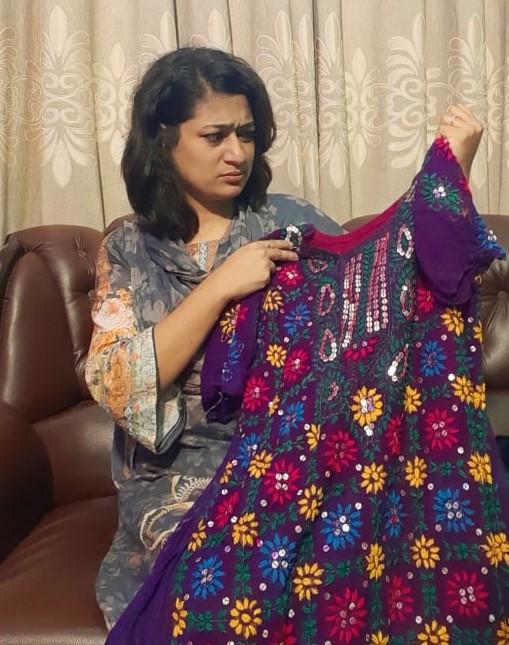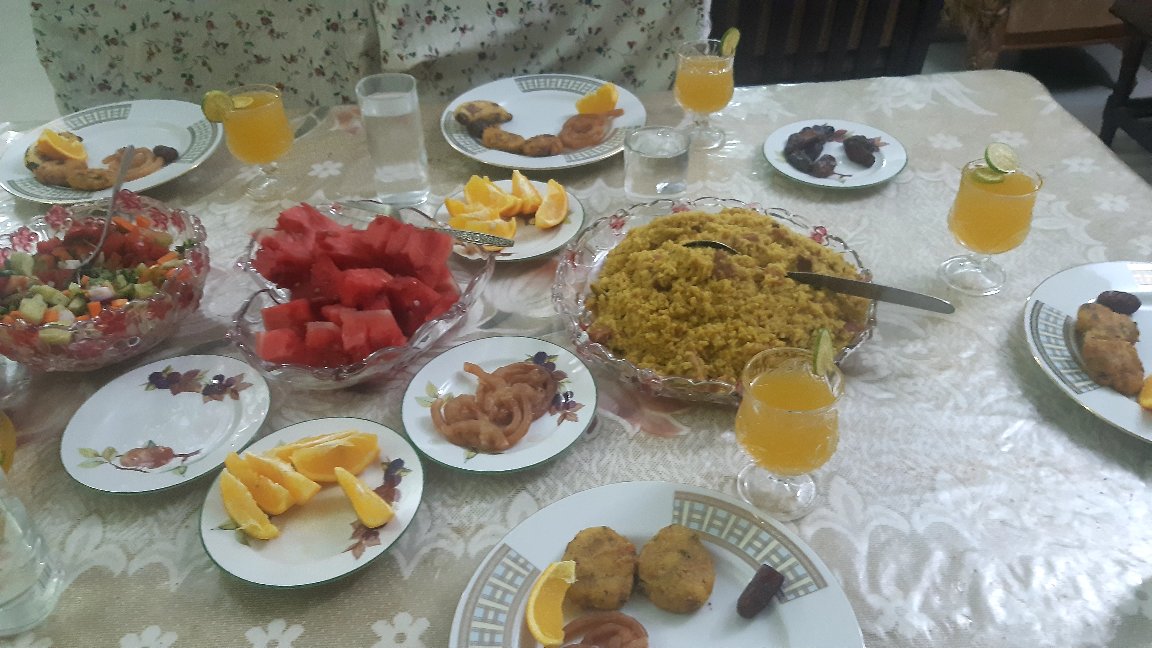Eid Dress
'This is for me? OK, I'll take it, but I cannot promise you that I will wear it on Eid* day.'
'Why, what's wrong with it?'
'I can’t wear this in front of my in-laws.'
'Why? Is it really such a bad dress? What’s wrong with it?'

'Please, I told you. I'll take it if you wish, but why don't you understand? My hubby* will give me so many nice dresses. How can I wear such a cheap dress in front of him and his family?'
'Oh. I get your point.'
'Thank God!'
Leela looked so annoyed. She left the room as quickly as possible. She didn't want to talk to her elder sister Neela anymore. It had been one year since she got married to a wealthy businessman. Now she feels so ashamed of her father's family, a family where even providing food is a struggle. Her father was a clerk in a private high school and her four brothers and sisters all studied there and received a special discount* because their father worked for the school. In this way, they could manage to get a better education from a city school. All of them had done well, and had gone on to study different subjects in public universities, but Leela had always wanted something more than just a good education. She loved to be in an expensive and luxurious* environment. At last, she managed to get what she wanted through her marriage, and now she is proud of her status.
On the other hand, her elder sister Neela became a high school Maths’ * teacher, and now she teaches in the same school where she and her brothers and sisters had studied. She's happy with her low-income job* and has not found anyone to marry yet. She didn't like the way Leela treated her today. Tears dropped from her eyes and she couldn't hide them from their mother.
'What happened? Why are you crying?', their mother asked.
'It’s nothing!'
'I can see your eyes,' mother said firmly. ‘You’ve been crying!’
'Leela didn't like the dress I gave her. She treated me so harshly*.' Neela explained.
'There’s no need to give her a dress. Just leave her to be herself.'
'But Maa, she is the youngest in our family. I must give her something.'
'She is not living with our family anymore! She doesn’t need anything from you. You need to think of yourself now.' Mother’s words sounded very strong.
'Maa, why are you saying this? Leela’s still young. She makes mistakes!'
'That’s not a mistake. It's a superiority complex*. Her in-laws have pushed her to feel this way, and they have been very successful. I don’t want you to feel bad again and again, because of them.’
‘But Maa, she’s my sister!’
‘You should just stay away from them.’
After so many happy years together, Neela was surprised by the sudden angry look her mother gave her.
And that is how an Eid dress separated the two sisters, and how they came to know how different they had become.
-----------------------
Leela was about to leave and was packing her things.
‘Maa, we will not have Iftar* here with you, for sure. If you want, send us some iftar dishes for your Jamaibaba*.’
‘It’s okay, I’ll send you something. Don’t worry.’
‘And don’t forget to add some extra sweets and fruit.’
Saying this to her mother, Leela left her father’s home. She needed to attend Iftar with her husband’s family members.
With a heavy heart, Neela began preparing the sharbat* glasses for all five of them. She removed the new glass set that she had planned to serve to Leela. She is wondering whether all six of her family members can have Iftar together this year. Their mother is clearly upset. She regrets creating the relationship with Leela’s in-laws, such a family which doesn’t have any respect for her own family.

Azan* begins, and everyone eats their delicious* iftar dishes in silence. Finally, mother speaks.
‘I think we should keep ourselves away from that family.’ Everybody realizes what she is trying to say.
‘But Maa, Leela’s husband is a very good person.’ Ratul tries to convince his mother.
‘I'm not telling you to behave badly towards him. When he comes to our home, we have to treat him as if he's a king, but that does not mean we should accept all the hurt that his family puts us through.’
Everybody in the room got the point of what she was trying to say. Arnob, the youngest brother, tried to change the topic.
‘Maa, can you give me some more cholaboot? It’s so spicy* and delicious* today.’ Ratul joined in.

‘Yes, Maa! I also want some more, please!’ Everybody started to talk at once, about the taste of the food, and their choices for the next days’ iftar, but Neela is still sad. All she can think about is her only sister, with whom she was raised in hardship. She herself taught Leela so much from early childhood. Neela wonders what she has done wrong that has made Leela turn out this way.
‘Should I listen to mother? Is it true? Are Leela’s in-laws turning her against us?’ Neela has become very quiet and thoughtful. She can’t think of any way to solve this problem. Perhaps mother is right after all. Perhaps it is time to put herself first. Perhaps it is time to let go...
Glossary
Azan: The call to prayer.
Cholaboot: A traditional Iftar dish in Bangladesh, cooked with green chillies, red onions, and other spices.
Delicious: Adjective used to describe food or drink that has a very good taste
Discount: A lower price than usual
Eid Dress: Eid is the biggest festival in the Bangladeshi Muslim community. There is a tradition of wearing a new dress on this day. Both the rich and poor try to buy new dresses for their family members.
Harshly: Adjective that describes words or actions that are not kind. The opposite of gentle.
Hubby: An informal word meaning ‘husband’
Iftar: During Ramadan, after fasting for the whole day, Muslims break the fast with an evening meal called Iftar. They start having Iftar as the call to evening prayer (Magrib) begins.
Jamaibaba: An expression meaning ‘son-in-law’ in the Indian subcontinent. After a daughter’s marriage, the new son-in-law becomes the most important guest in the wife’s family.
Low-income job: Work for which someone does not get paid well
Luxurious: richly decorated, more beautiful than most, most comfortable
Maths: A short form of the word ‘Mathematics’ (the study of numbers)
Sharbat: A trendy, sugary drink primarily prepared with lemon, orange, and other ingredients that is taken at the start of Iftar.
Spicy: Food becomes spicy when certain hard parts of different plants are added to make it taste hot, or strong (e.g. chilli pepper, cinnamon, mustard, ginger).
Superiority complex: This expression describes the feelings of someone who thinks they are better than other people.
__________
Learning Activities
Vocabulary
1. Words from the second 1000 high frequency General Service Word List (GSL)

2. Words from the Academic Word List (AWL)

Comprehension Questions
- Remembering: What is the relationship between Leela and Neela? Who is older? How do you know?
- Remembering: What does Leela say is the reason she won’t wear the dress Neela gave her?
- Understanding: This phrase tells us something about Leela... “she managed to get what she wanted through her marriage.” What does it mean? “
- Understanding: What does the expression “time to let go” mean?
- Inferring: Why does the mother in the story get upset? How does she feel about Leela’s new family? How do you know? (Which parts of the story show you the answers to these three questions?)
- Inferring: Why did everyone at the table begin to talk at once? (Give information from the story that helped you to answer this question.)
Critical Thinking Questions
1. Analysing:
Here are some English adjectives that describe people. Which words best describe the characters in the story? (A word may go in more than one box.) You may need to check the meanings of the words in a dictionary.
angry, selfish, forgiving, accepting, kind, understanding, hurt, rude, weak, open-minded, spoiled, generous, ungrateful, resentful, uncaring, proud
| Leela | Neela | Mother | Ratul |
|
|
Now decide which words have a positive meaning, and which words have a negative meaning?
2. Applying: If you were Neela, what would you do? Would you talk to your sister and explain how hurt you feel, or would you stop talking to her completely? Give some reasons (in English) for your answer.
3. Evaluating: In your view, what would be the best way to solve this family problem? Why do you think your idea would work? In English, give reasons and examples to support your point of view.
4. Creating: Do one of the following activities...
A - Work with a partner. Create a short play. Your play should be about a conversation between Neela and Leela in which Neela explains her hurt feelings to Leela and asks her to change her behaviour.
You can decide whether the problem between the two sisters is solved, or whether it gets worse. It’s up to you. Write a script, and get your teacher to check it for accuracy. Then, practice your play, and finally perform it for other members of your class.
B - Divide your class into groups of five people. Each person should write a short paragraph that takes the point of view of ONE of the following characters (Leela, Neela, Mother, Ratul, Leela’s husband). Everyone should choose a different character. In your paragraph, explain how your character really feels and thinks about the situation in the story, using the pronoun ‘I’ so that your writing sounds as if you are that character. Give reasons for your point of view.
When you have finished, take turns to read your paragraph to the other people in your group. Then, have a short debate and try to persuade each other to change the way they think about this situation. Try to get other people in your group to think about the situation the way your character thinks.
C - Work with a partner and design a new, luxurious Eid dress for Leela. Put your design on a poster. Be ready to explain your design to your classmates. On your poster, include a small amount of information about...
- what your dress will be made of (materials)
- what colour(s) it is
- why you created this design
- how much you think it will cost to make
- how much you think someone should pay for it
- why your design is the best
Next, have a class Eid dress ‘Fashion Expo’. Your class should divide into two groups. Group One pairs will share their posters first, while Group Two people will listen and ask questions about each design. After about eight to ten minutes, change over. Group Two pairs will share their posters while Group One people listen and ask questions.
Finally, have an individual vote for the best design. (You should not vote for your own pair’s design.) This should all take place in English, of course. Don’t forget to congratulate the winners!